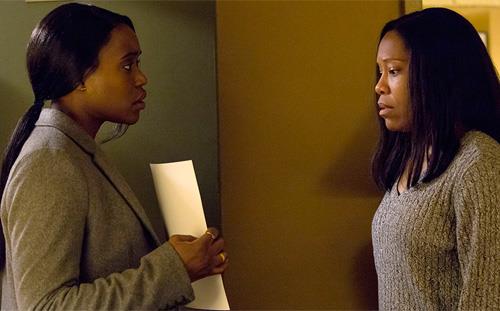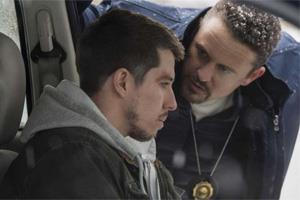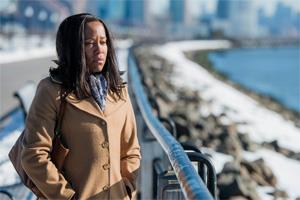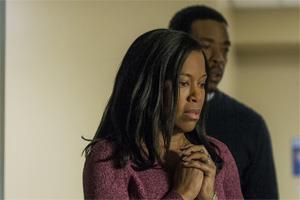
Whether misery loves company is debatable. Whether Veena Sud loves misery is not.
The architect of The Killing again is a determined bearer of bad tidings as the creator and writer of Netflix’s Seven Seconds, whose 10-episode Season 1 began streaming on Friday, Feb. 23. It’s a full-out endurance test in times that already seem unendurable enough. But I dug in and watched Seven Seconds in its entirety. Not because I’m a glutton for gloom, but because . . . well, maybe I am. And Sud certainly is accomplished in her own ways as a proudly unbowed teller of festering murder stories, and the profoundly imperfect people caught up in them.
The Killing, adapted from a Danish TV series, ran for two seasons on AMC and then two more on Netflix. Its overriding question of “Who Killed Rosie Larsen” spilled over into Season 2, leaving some TV critics almost comically furious. In contrast, Seven Seconds (based on the Russian movie The Major) identifies the perpetrators from the very start. The open question is whether they’ll get away with it.
 Rookie cop Peter “Petey” Jablonski (Beau Knapp, left), whose wife is pregnant, is preoccupied talking on his cell phone about her latest developments when he hits something that turns out to be a someone. Fifteen-year-old black teenager Brenton Butler had been riding his bike through Jersey City’s Liberty Park when Jablonski’s SVU struck him. He calls his drug unit pals to the scene and initially is intent on reporting the tragedy as an accident, which it was.
Rookie cop Peter “Petey” Jablonski (Beau Knapp, left), whose wife is pregnant, is preoccupied talking on his cell phone about her latest developments when he hits something that turns out to be a someone. Fifteen-year-old black teenager Brenton Butler had been riding his bike through Jersey City’s Liberty Park when Jablonski’s SVU struck him. He calls his drug unit pals to the scene and initially is intent on reporting the tragedy as an accident, which it was.
But the completely crooked head of the unit, Mike DiAngelo (David Lyons, above), tells him that a coverup is mandatory. Otherwise, “they’re gonna crucify you for this,” meaning both the black community and the media. Petey very reluctantly agrees to drive away and let the crew handle things. Meanwhile, Brenton remains alive but severely injured after the impact knocked him into an adjacent snowbank from which the Statue of Liberty is clearly visible, but with its back turned. Sud is not subtle with her metaphors.
Otherwise, the dynamics for Seven Seconds very much mirror those of The Killing. The victims both are teenagers with what turn out to be secret lives. The principals assigned to solve the case have deep personal issues, both in their own lives and initially with one another. The severely grieving parents demand justice and become divided as a result. The weather is bad and the stink of corruption omnipresent. Plus, a sometimes excruciatingly slow pace and the unrelenting grimness of the story may well serve to lose many viewers well before the denouement, at last, is at hand. FYI, Sud has never been much on the uplift, so don’t expect the clouds to part at the end.
 Also, as in The Killing, the performances aren’t the perpetrators. Regina King (top and left), who won two acting Emmys in different roles for ABC’s like-minded American Crime, again is first-rate as Brenton’s grieving, religious mother, Latrice. Also excelling are Michael Mosley as wisecracking detective Joe “Fish” Rinaldi, and Care-Hope Ashley (top) as young African-American assistant district attorney KJ Harper, who’s also a promiscuous drunk. But in this case, can she finally rise to the occasion with help from the constantly badgering Fish?
Also, as in The Killing, the performances aren’t the perpetrators. Regina King (top and left), who won two acting Emmys in different roles for ABC’s like-minded American Crime, again is first-rate as Brenton’s grieving, religious mother, Latrice. Also excelling are Michael Mosley as wisecracking detective Joe “Fish” Rinaldi, and Care-Hope Ashley (top) as young African-American assistant district attorney KJ Harper, who’s also a promiscuous drunk. But in this case, can she finally rise to the occasion with help from the constantly badgering Fish?
Latrice’s hard-working and even more devout husband, Isaiah, is solidly played by Russell Hornsby. An extra layer of dreariness finds him working double shifts at a slaughterhouse when the medical bills pile up. There’s also wayward, drug-addicted teen informant Nadine (effectively played by Nadia Alexander), who largely replicates a character from Season 3 of The Killing.
On the downside, Lyons’ rogue cop DiAngelo comes close to being laughably sinister whenever the heat is on. “You watch your tone with me,” he sneers for the first of several times in Episode 3. And in Episode 6, DiAngelo deploys the now well-frayed “What the f**k you lookin’ at?”
The overriding point of Seven Seconds is that all lives matter, no matter how troubled they were or are. Sud has a tendency to drive this home with a sledgehammer as the racial politics heat up. But DiAngelo and his men continue to get away with murder, whether protecting their cover-up or their turf -- in this case a drug ring where everybody’s been getting a nice cut.
Sud hopes to turn Seven Seconds into an anthology, repertory company franchise in the mold of the critically lauded American Crime, which lasted three seasons on ABC. But American Crime was superior to Seven Seconds in its efforts to tell difficult, consciousness-raising stories via an ensemble of changing characters in entirely different environments. Nonetheless, it never found more than a minimal audience that declined in each season.
 “I felt desperate to tell this story,” Sud said in a recent interview with The New York Times. “It’s about time to hear people of color and women telling stories that speak to our experience, or close to our experience. We know these stories. The truth of them is ours to tell.”
“I felt desperate to tell this story,” Sud said in a recent interview with The New York Times. “It’s about time to hear people of color and women telling stories that speak to our experience, or close to our experience. We know these stories. The truth of them is ours to tell.”
In fact, though, these stories already are being told in abundance -- to the point where many viewers justifiably may want or even need a break. Seven Seconds, which runs for more than 10 hours that seem like 15, follows the grim and grimy Sud playbook without really saying much of anything new. The fault lies not with its stars, most of whom perform very ably or well beyond that. It’s just that sometimes enough is enough -- with the real world already doing more than its part to pound down our spirits.